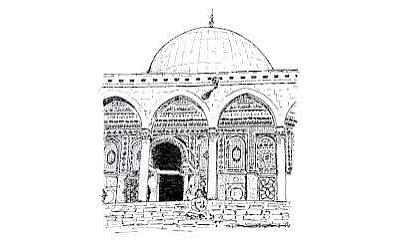The Prophet (pbuh) and poverty

The Prophet of Islam, Hazrat Mohammad (Allah's peace be upon him) said: "Poverty is my pride." What is the nature of that poverty and what is the essence of that pride? Materially and spiritually the Prophet personified in himself poverty so as to be addressed by his Lord as servant (Abd) first and then messenger (Rasul).
The Prophet was born an orphan. His grandfather Abdul Mottalib, the leading man of the Quarish, was a wealthy person but Abdullah, the father of the Prophet, died young and had left his son five camels, a small flock of sheep and goat and a slave girl. The Prophet's mother, Amina, was poor. In the absence of a father, Halima, foster mother to the Prophet, demurred at first to nurse and foster Amina because she herself was not so well to do.
The Prophet lost his mother at the age of seven and his guardian grandfather at the age of nine. He became dependent on his uncle Abu Talib, earning his livelihood by pasturing sheep and goat and occasionally accompanying his uncle's merchant caravan to Syria. He found himself in the employment of a business woman, Khadija, solely on his reputation as an honest and trustworthy person. Impressed by his honesty and beauty she proposed to marry him. When the proposal was conveyed to him, the Prophet exclaimed: "And how could such a marriage be mine?" He had to give only 20 camels as dowry.
The Prophet's simple propagation of the faith: "There is no God but God and Mohammad (pbuh) is His prophet," with all earnestness and an unflinching conviction so unnerved and shook the pagan belief in idol worshipping that the leaders of the Quraish said to him that if it was money he wanted, they would make him the richest among them; if it was honour, he should be their prince; if it was sovereignty they would make him king; if it was a spirit which got possession of him, they would exhaust their means finding medicines to cure him. The answer the Prophet gave was that he had conveyed to them God's message and they could either accept it to their advantage or reject it and await God's judgement.
The Holy Quran which Allah revealed through the Prophet declares that man is poor before the majesty and munificence of Allah. Sura Fatir (Ayat15) says: "O ye man! It is you that have need of Allah but Allah is the One free of all wants, worthy of all praise. “Fukara" is the Arabic origin of the Bangla word fakir. Prophet Mohammad (peace be upon him) internalised the absolute need of Allah so deeply, so dearly and so unquestionably, that he wanted poverty and said: "O God, make me live lowly and die lowly and rise from the dead among the lowly."
Lowliness and servitude before the Almighty are attributes the Prophet of Islam adorned. Lowliness before God is a spiritual stage which the Prophet and the sufi saints after him preferred in order the reach the glorious Lord. Hazrat Abdul Quader Jilani (God's mercy be upon him) narrates in his book of discourse, Al-Fat Al Rabbani, that one day a man came to the Prophet and said: "O Messenger, I love you." The prophet answered: "Be prepared to wear the garment of poverty." That is, be ready to accept poverty. Another man approached the prophet and said: "I love Allah the glorious." The Prophet said: "Go, be ready to wear the garment of agonies and afflictions." Hazrat Abdul Quader maintained that the love of God and His Messanger is related to poverty and affliction.
Lowliness in the eye of God is an attribute of His servants; it is not a divine attribute. The Prophet was proud of this attribute which was his own and through which he gained proximity to his Lord, hence he said: "Poverty is my pride." Both the Quran and Hadith mention the honoured status of the poor in the eye of Allah, the compassionate. "Poverty has a “rasm" (form) and a “haqiqat" (essence). Its form is destitution and indigence but its essence is fortune and free choice. He who regards the form rests in the form and failing to reach his object flees from the essence; but he who has found the essence averts his gaze from all created things and in complete annihilation, seeing only the All One, he hastens towards the fullness of eternal life" (Kashf Al Mahjub by Al Hijwari, the 11th century sufi saint and writer -- also known as Hazrat Data Ganj Bux).
The Prophet said: "Poverty is glorious to those who are worthy of it." Al Hijwari explains that the glory is that the poor man's body is divinely preserved from base and sinful acts and his heart from evil and contaminating thoughts because his outer parts are absorbed in contemplation of the manifest blessings of God while his inner parts are protected by invisible grace.
Muslims throughout the world venerate the Prophet with endearing and eloquent titles. But the prerogatives and graces did not induce the Prophet to take pride in them; he was so detached that all the wonderful qualities notwithstanding he could say: "Poverty is my pride." And he could pray: "O Lord, keep me one day full fed and one day hungry."

 For all latest news, follow The Daily Star's Google News channel.
For all latest news, follow The Daily Star's Google News channel. 



Comments